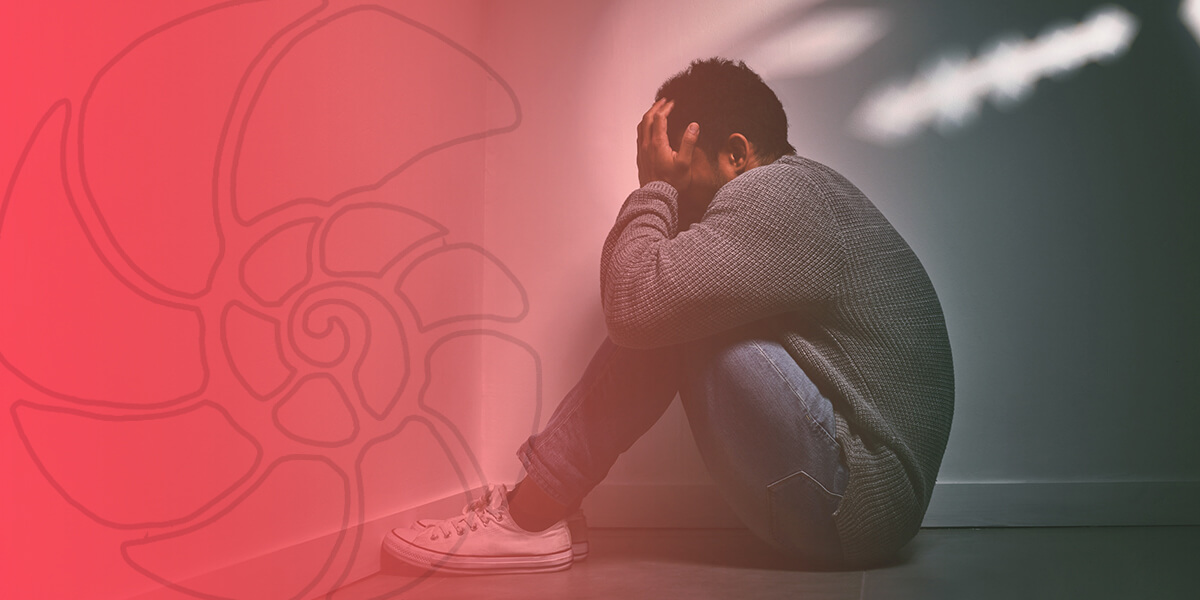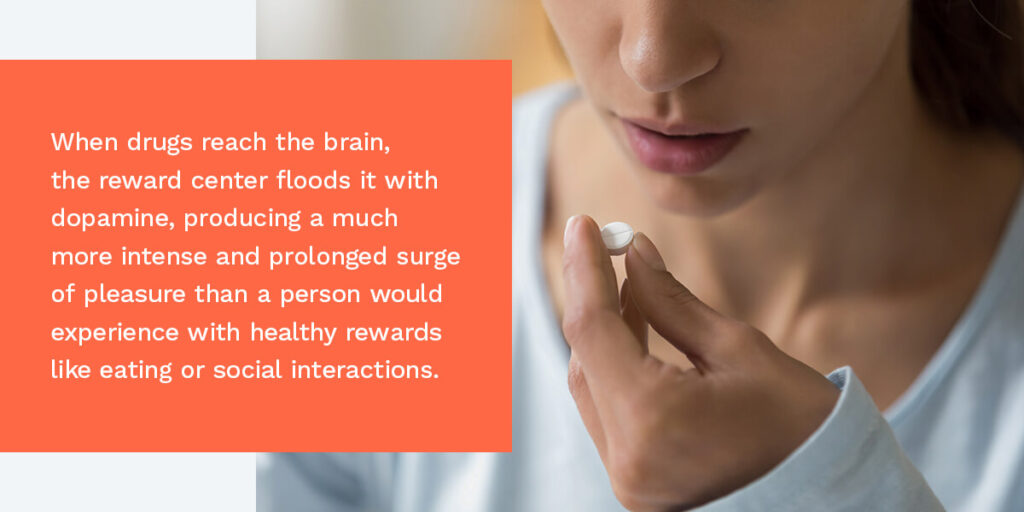What Causes Addiction in the Brain?
Addiction is a complex and often devastating condition that's shockingly widespread — one study revealed that 40.3 million Americans struggled with a substance use disorder in 2020. While the causes of addiction are multifaceted and can vary from person to person, one thing is clear: Addiction is a brain disease.
Researchers have made significant strides in understanding addiction's underlying neural mechanisms and how they contribute to developing and maintaining addictive behaviors. By examining how drugs and other addictive substances interact with the brain's reward system, scientists are uncovering new insights into the nature of addiction and how best to treat it.
Join us as we dive deeper into what causes addiction in the brain and what it means for those struggling.
Understanding the Brain's Reward System
The brain's reward system is a network of neural circuits that plays a crucial role in regulating feelings of pleasure and motivation. At the heart of this system is a group of structures called the basal ganglia, which are involved in positive forms of motivation and forming habits and routines.
When we engage in pleasurable or rewarding activities, such as eating, socializing or having sex, we activate our brain's reward system, which responds by releasing a chemical called dopamine. This dopamine surge produces a sense of pleasure and satisfaction, signaling the brain to remember the activity so it can experience the same feelings again. Neural connectivity changes make it easy to repeat the action over and over again without much thought, leading to habit formation.
There are many ways to trigger dopamine release naturally, including the following:
- Physical exercise
- Listening to music
- Meditating
- Spending time in nature
- Engaging in creative pursuits like painting or writing
- Spending time with loved ones
- Engaging in acts of kindness or volunteering
- Getting enough sleep
- Reducing stress
- Eating a nutritious diet rich in protein and healthy fats
What Causes Addiction in the Brain?
Natural, healthy dopamine triggers aren't the only way to stimulate the brain's reward center. Unfortunately, it can be hijacked by drugs and other addictive substances, leading to an addiction.
Often, people turn to addictive substances when they feel stressed or depressed. When these drugs reach the brain, the reward center floods it with dopamine, producing a much more intense and prolonged surge of pleasure than a person would experience with healthy rewards like eating or social interactions. This process starts to change the brain chemistry, and the person needs increasing amounts of the substance to feel good.
Genetics and environmental factors can also influence addiction. Certain genes may make individuals more susceptible to addiction, while environmental factors like stress, trauma and peer pressure can increase addiction risk. Additionally, early exposure to drugs or alcohol can increase the likelihood of addiction later in life.
What Does the Brain Do During Addiction?
As a person continues to feed their addiction, the brain adapts to the flood of dopamine by reducing the number of dopamine receptors. This is known as building tolerance and means the person needs more and more of the drug to achieve the same level of pleasure.
As addiction progresses, the reward system in the brain of an addict becomes increasingly dysregulated. Pursuing drugs or other addictive substances becomes the individual's primary focus in life, while activities they once enjoyed lose their appeal. This is because the brain's reward system has become hypersensitive to drugs and desensitized to other rewards.
Addiction can also affect a person's focus, learning and memory, as well as their judgment and decision-making ability. The pursuit of drugs becomes a habit rather than a conscious decision.
Addiction can also change other areas in the brain, including the prefrontal cortex and the amygdala. The prefrontal cortex is involved in thinking, planning, problem-solving, decision-making and impulse control. The amygdala helps regulate emotions like irritability, anxiety and unease, which individuals feel when a drug wears off, prompting them to seek more of it.
These changes in brain function can lead to compulsive drug-seeking behavior and a reduced ability to experience pleasure from other activities.
Even when the individual wants to quit their addiction, the brain's reward system can make it incredibly difficult to do so, as the withdrawal symptoms and cravings can be overwhelming.
Can an Addicted Brain Heal?
The good news is that addicted brains can heal. While addiction changes the brain's structure and function, research has shown that the brain has a remarkable capacity for neuroplasticity. Neuroplasticity is the brain's ability to form new neural connections and reorganize existing ones, allowing it to adapt to environmental changes and recover from injury or damage.
Neuroplasticity indicates that the brain is not a fixed, static organ but rather a dynamic and adaptable one that can change in response to learning and new experiences. This means that with the right treatment and support, it's possible for the brain to recover from the effects of addiction.
One of the most essential factors in the brain's ability to heal from addiction is the individual's motivation to change. This motivation can come from many different sources, including a desire to improve one's health, relationships or quality of life.
Another important factor in the brain's ability to heal from addiction is the availability of effective treatments and support. Various evidence-based addiction treatments, including behavioral therapies and medications, have helped individuals overcome their addictions. Emotional support and encouragement from friends, family and peers can also be a key part of recovery.
Remember that addiction recovery is not a one-size-fits-all process, and the healing timeline can vary widely depending on the individual and the severity of their addiction. Some may experience a relatively quick recovery, while others may require ongoing support and treatment to maintain sobriety.
Start Healing Today at Transformations By The Gulf
Addiction is a complex disorder that's largely influenced by brain chemistry. While some people are more susceptible to addiction than others, anyone can develop an addiction upon exposure to substances or behaviors that trigger the brain's reward system.
Understanding the underlying mechanisms of addiction allows us to develop more effective prevention and treatment strategies that address the root cause of this condition. Ultimately, breaking the cycle of addiction requires a combination of medical, psychological and social support to help individuals overcome their dependence and achieve long-term recovery.
If you or someone you care about is ready to heal from an addiction, you can find support at Transformations by the Gulf in beautiful St. Pete Beach, Florida. We offer a combination of holistic practices and traditional therapies to help clients overcome their addictions and reclaim their lives. Get in touch today to discover which programs and services are best for you.
If you or someone you know would like to know more about Transformations by the Gulf Substance Abuse Treatment Center Give us a Call 24/7 (727)498-6498
The success of a person’s recovery depends on the level of personalized treatment provided. It is important to find an addiction treatment program that works. When we say our treatment is individualized, we mean that we craft a program that is tailored to address the client’s unique physical, mental and emotional needs.
In the client’s first 24 hours with us, we’ll evaluate their current state and work to understand what challenges they need to overcome. They’ll also have an initial session with our doctor and meet with one of our licensed mental health professionals.
After the initial evaluations, we’ll design a treatment plan with the sole mission of helping the client overcome and heal from addiction. Their program will focus on things such as:
- Addressing and Identifying root causes of addiction.
- Creating a support system.
- Developing healthy stress management techniques.
- Eliminating Substance use.
- Learning how to communicate emotions effectively.
- Maintaining a healthier lifestyle.
- Repairing damaged relationships.
Our Facility is near the beach and offers a comfortable setting for substance abuse treatment and recovery.
What a Day is Like in Our Treatment Facility.
Why Transformations by the Gulf?


